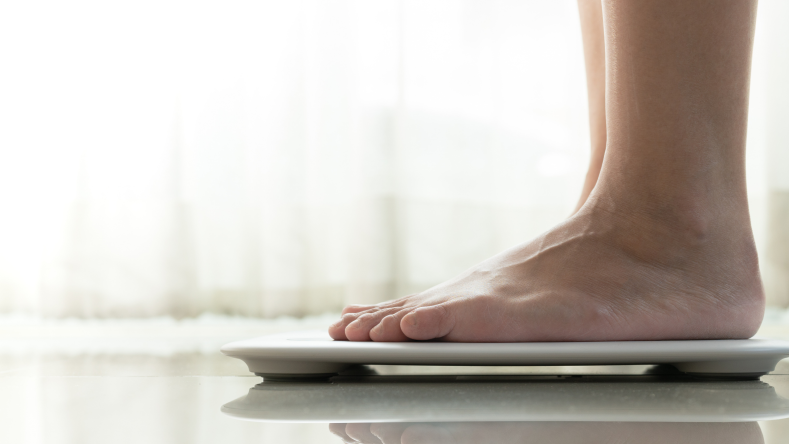Can I lose weight without dieting?
This question is about GLP-1 & Weight Loss and Nutrition
Yes, you can lose weight without dieting through making small, sustainable lifestyle changes and adopting healthier habits. Here are 16 small things you can do to promote weight loss without dieting.
Start a daily walking routine. You don’t have to walk a marathon each day; even 10-15 minutes can be beneficial for boosting your metabolism and increasing physical activity.
Cut back on sugar. While sugar can be enjoyed in small amounts, consuming excess amounts of refined (or added) sugars over time takes a toll on your body.
Added sugar
is a significant source of excess calories and can increase your risk of chronic disease and obesity. Cutting back can have big benefits on both weight loss and metabolic health, so try to consume less added sugar (particularly from sugar-sweetened beverages, packaged foods, breakfast cereals, and sweets) by making simple swaps throughout the day [1
].Choose whole grains. Replace highly refined grains (like white pasta, white bread, and white rice) with whole grains (for example, whole wheat pasta, whole grain bread and brown rice), as this will promote satiety and aid in weight loss.
Prioritize veggies and protein. Fill up on non-starchy vegetables and lean protein first to promote satiety at mealtime.
Take a look at your plate. Larger plates usually equate to larger portions and can make it easy to overeat. Consider grabbing a smaller plate at mealtime and going back for seconds if you’re still hungry.
Stay hydrated. Drink at least 64 ounces of water each day to promote satiety, boost metabolism, improve workout effectiveness, and aid in weight loss. An easy way to break this up throughout the day is to have 16 ounces with breakfast, lunch, dinner, and during snack times [
2
].Cut back on the booze. Alcohol is a top source of empty calories, so an easy way to cut back is to avoid weekday drinking and limit yourself to 1-2 adult beverages on the weekend.
Consider why you’re eating. Listen to your body’s hunger cues and avoid eating if you are not truly hungry.
Get enough sleep. Sleep deprivation causes an imbalance of appetite-regulating hormones and can lead to overeating and poor food choices. As such, it’s recommended to aim for 7-9 hours of sleep each night for optimal health benefits and weight loss outcomes. However, if you have a hard time falling (or staying) asleep, here are some
sleep supplements
that may help.Use your muscles. Switch things up in the gym and add strength training to your exercise regimen (2-3 days/week) to increase metabolism and aid in weight loss.
Destress. High stress levels can contribute to weight gain and also make weight loss more difficult. To help take the edge off, make time for things that help you destress, like reading, exercise, yoga, meditation, or a favorite hobby.
Fill up on fiber. Since fiber promotes satiety, it can help promote weight loss and weight management [
3
]. Aim for at least 25-35 g of fiber/day from whole foods like fruits, vegetables, whole grains, beans, lentils.Try time restricted eating. Some evidence suggests that simply reducing the number of hours you eat each day can be beneficial for weight loss [
4
]. Learn more aboutintermittent fasting
and its longevity benefits.Eat without distractions. Research shows distracted eating tends to make you eat more, whereas paying attention to what you’re eating (and how you’re feeling) has the opposite effect [
5
].Optimize your eating environment. The foods you buy tend to influence the number on the scale. Stock your fridge and pantry with wholesome, nutritious foods rather than processed, packaged choices that have low nutritional quality.
Make more room for veggies. Fill at least half your plate with non-starchy vegetables at every meal. Non-starchy vegetables are full of water and fiber (which promote satiety) and contain essential vitamins, minerals and antioxidants that benefit health.

People also ask:
References:
Added Sugar in the Diet. (2019, January 2). The Nutrition Source. Retrieved April 4, 2022, from
https://www.hsph.harvard.edu/nutritionsource/carbohydrates/added-sugar-in-the-diet/
Dennis, E. A., Dengo, A. L., Comber, D. L., Flack, K. D., Savla, J., Davy, K. P., & Davy, B. M. (2010). Water consumption increases weight loss during a hypocaloric diet intervention in middle-aged and older adults. Obesity (Silver Spring, Md.), 18(2), 300–307.
https://doi.org/10.1038/oby.2009.235
Fiber: Fiber’s Link With Satiety and Weight Control. (2015, February). Today’s Dietitian. Retrieved April 4, 2022, from
https://www.todaysdietitian.com/newarchives/021115p14.shtml
Peeke, P. M., Greenway, F. L., Billes, S. K., Zhang, D., & Fujioka, K. (2021). Effect of time restricted eating on body weight and fasting glucose in participants with obesity: results of a randomized, controlled, virtual clinical trial. Nutrition & Diabetes, 11(1).
https://doi.org/10.1038/s41387-021-00149-0
Robinson, E., Aveyard, P., Daley, A., Jolly, K., Lewis, A., Lycett, D., & Higgs, S. (2013). Eating attentively: a systematic review and meta-analysis of the effect of food intake memory and awareness on eating. The American Journal of Clinical Nutrition, 97(4), 728–742.
https://doi.org/10.3945/ajcn.112.045245
